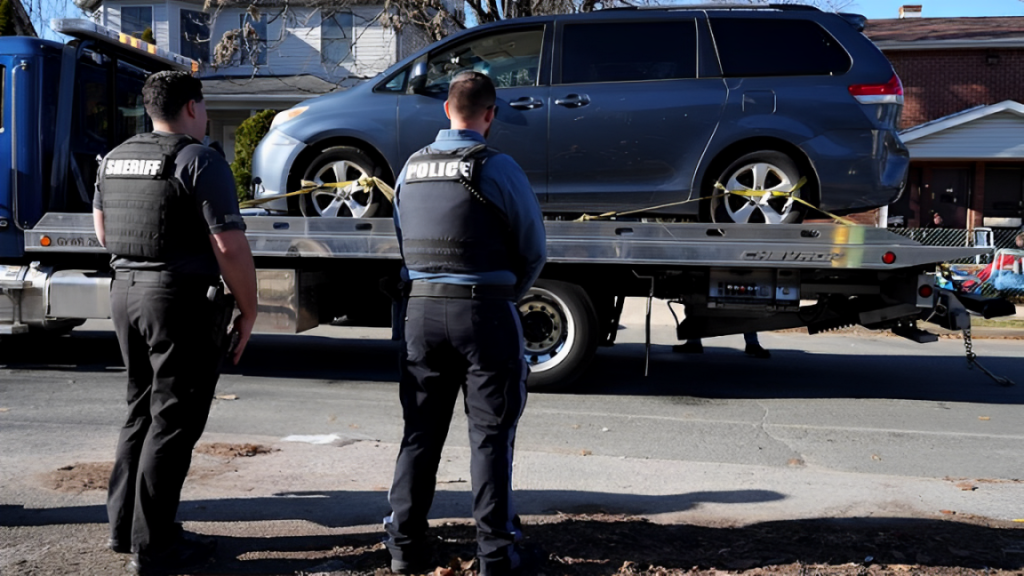
Moshe Ehrlich, a 35-year-old father from Lakewood, New Jersey, is facing charges of child endangerment after the heartbreaking death of his 4-month-old son, who was left inside the family minivan for over two hours on March 18.
According to a probable cause affidavit, Ehrlich had long feared this very scenario.
He told investigators that he had developed several methods to prevent himself from forgetting his baby in the car, including placing his hat on the front passenger seat as a visual reminder. But despite these precautions, a hectic morning caused his routine to unravel.
That morning, Ehrlich was preparing his six children for the day while his wife, Faiga Ehrlich, left for work around 9:30 a.m.
Due to their 6-year-old missing the school bus, Ehrlich had to take on extra drop-offs. He loaded the children into the family’s Toyota Sienna and began his morning drop-off routine.
The baby was supposed to be dropped off first at the babysitter’s house. However, Ehrlich realized he had forgotten the infant’s milk.
Instead of returning directly after retrieving it, he first dropped off his 4- and 2-year-olds at daycare and his 6-year-old at school.
He returned home to grab the milk and some other items, but distracted by the busy morning, he forgot the baby was still in the car.
He then drove to his yeshiva, a local religious school, and entered at approximately 11 a.m.
It wasn’t until 1:30 p.m., when he was informed of an emergency call from his wife, that the tragic mistake was discovered. As he was heading to take the call, he was approached by Zevi Kitay, the 19-year-old son of the babysitter, who urgently asked, “Where is your baby?”
Ehrlich ran to the car, found his child unresponsive, and immediately called Hatzolah of Central Jersey. The baby was rushed to a medical center, where he was pronounced dead at 2:40 p.m.
An investigation was launched the same day. A virtual autopsy was conducted that evening, followed by a full autopsy to determine the exact cause of death.
The baby’s name was not released in the public court documents.
At the time of discovery, the temperature inside the parked minivan had reached 96.2 degrees Fahrenheit, despite the outside temperature being only 67.8 degrees.
The child became the first in the U.S. to die in a hot car in 2025, according to Kids and Car Safety, an organization that tracks such incidents and promotes prevention strategies.
These tragedies often occur when a parent experiences a change in routine or is under stress, according to Janette Fennell, founder of Kids and Car Safety.
The part of the brain that allows people to function on autopilot—like forgetting a coffee on the roof of a car—can also lead to fatal oversights.
While it’s a mistake most parents believe could never happen to them, Fennell stresses that such accidents have involved professionals from all walks of life—including teachers, doctors, police officers, and even rocket scientists.
From 1990 to 2020, over 1,100 children have died in hot cars in the U.S., and more than 7,500 have survived with injuries. In 2024 alone, there were 40 hot car deaths recorded between May and November, with summer months being the most dangerous.
Authorities consider various factors when deciding whether to file criminal charges in such cases. One key consideration is whether the child was knowingly left.
Between 1990 and 2020, over half of such cases didn’t lead to a conviction, and roughly 41% of parents who claimed they forgot their child weren’t charged.
To help prevent these tragedies, experts offer several safety tips:
- Never leave a child alone in a vehicle, even briefly.
- Keep car doors locked and keys out of children’s reach to prevent them from climbing into vehicles on their own.
- Leave an important item—like your phone or purse—in the back seat next to the child so you’re forced to look before leaving the vehicle.
- Place a diaper bag or stuffed animal in the front seat when your child is in the back to act as a visual cue.
- Set reminders on your phone or ask your childcare provider to call if your child doesn’t show up as scheduled.
Fennell also suggests always placing a stuffed animal in the car seat when it’s empty. When the child is buckled in, move the stuffed animal to the front seat as a visual reminder.
The heartbreaking story of Moshe Ehrlich and his infant son serves as a painful reminder that a single lapse in memory can have irreversible consequences—and that heightened awareness and proactive safety steps can make all the difference.
